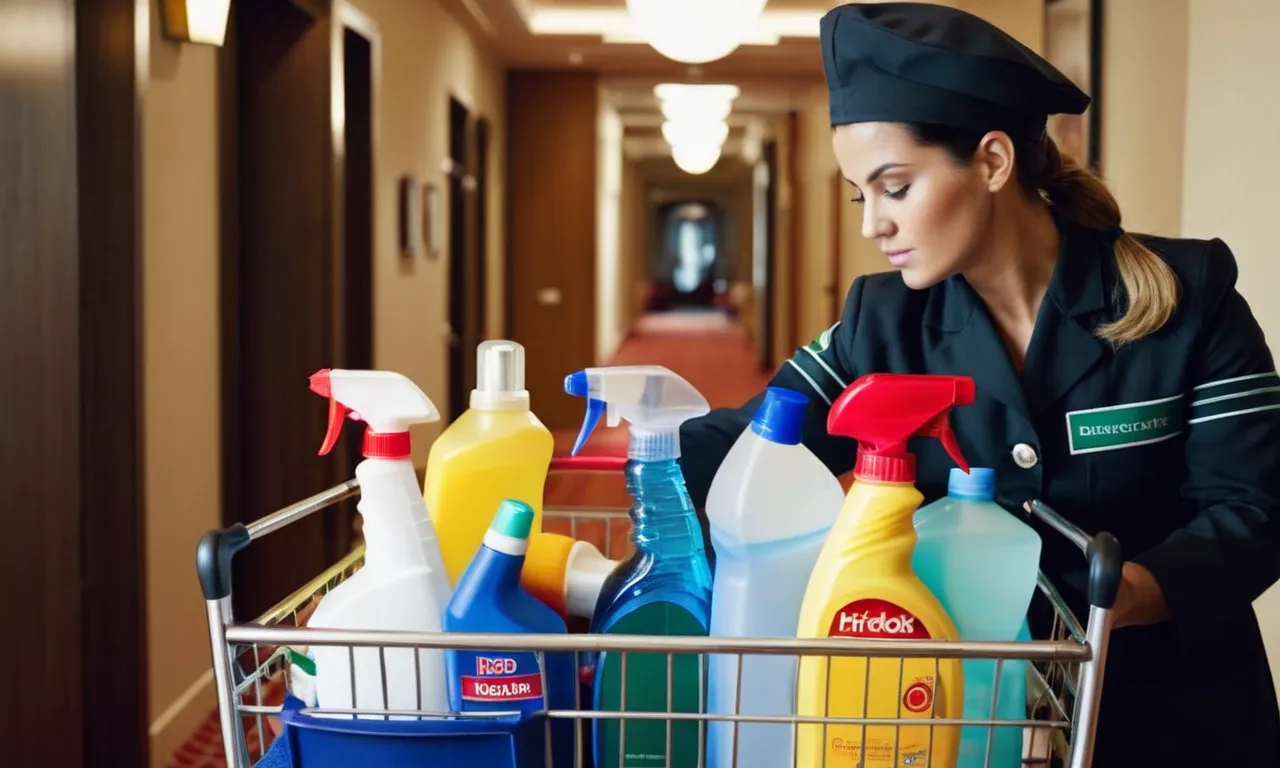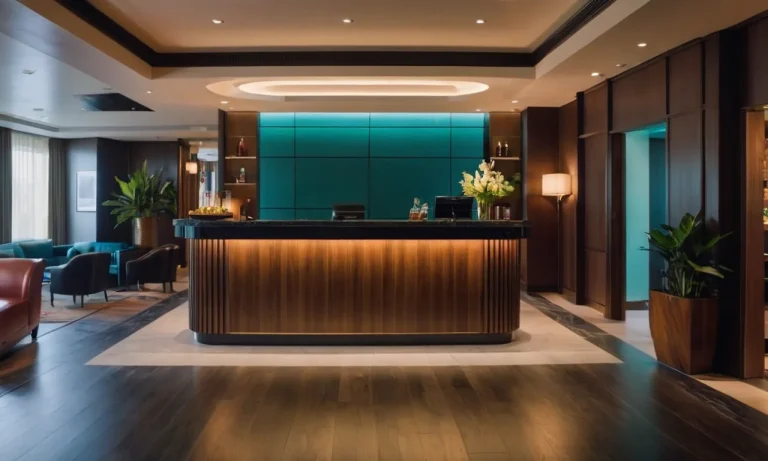How Many Hours Do Hotel Housekeepers Work? A Comprehensive Guide
Imagine waking up in a luxurious hotel room, with crisp sheets and a spotless bathroom – the work of a dedicated housekeeper. But have you ever wondered about the hours these unsung heroes put in to ensure your stay is comfortable and pristine?
If you’re short on time, here’s a quick answer to your question: Hotel housekeepers typically work between 6 to 8 hours per day, with shifts ranging from part-time to full-time. However, the exact number of hours can vary depending on factors such as the hotel’s size, occupancy rates, and staffing levels.
In this comprehensive article, we’ll delve into the nitty-gritty of a hotel housekeeper’s work schedule, exploring the factors that influence their hours, the challenges they face, and the industry standards that govern their workload.
Whether you’re a curious traveler or someone considering a career in hospitality, this guide will provide you with a detailed understanding of the demanding yet essential role of hotel housekeepers.
Factors Influencing Hotel Housekeeper Work Hours
The workload and schedules of hotel housekeepers can vary greatly depending on several key factors. These dedicated professionals are responsible for maintaining the cleanliness and guest-readiness of hotel rooms, ensuring a comfortable and welcoming experience for visitors.
However, the number of hours they work can fluctuate based on the following circumstances:
Hotel Size and Occupancy Rates
Larger hotels with more rooms to service typically require a larger housekeeping staff working longer hours to keep up with the demand. Occupancy rates also play a significant role – during peak seasons or special events when the hotel is at full capacity, housekeepers may need to work overtime to ensure all rooms are properly cleaned and prepared for new guests.
According to Hotel News Resource, the average occupancy rate for hotels in the US was around 66% in 2022, indicating a substantial workload for housekeepers.
Staffing Levels and Workload Distribution
Adequate staffing is crucial for managing the workload efficiently. Hotels with a larger housekeeping team can distribute tasks more evenly, potentially reducing the individual workload and required hours.
However, in cases of understaffing or high employee turnover, the remaining housekeepers may need to work longer shifts to cover the demand. According to a survey by Zippia, the average hotel housekeeper works around 40 hours per week, but this can vary significantly based on staffing levels.
Peak Seasons and Special Events
The hospitality industry experiences peak seasons and special events that can significantly impact the workload for housekeepers. During holidays, conventions, or major local events, hotels often experience a surge in occupancy, resulting in increased demand for room cleaning and preparation.
Housekeepers may need to work longer shifts, including weekends and holidays, to accommodate the influx of guests. Can you imagine the workload during events like the Super Bowl or the Oscars? 😅 It’s a true test of endurance for these hardworking professionals!
Room Types and Cleaning Requirements
Not all hotel rooms are created equal when it comes to cleaning requirements. Larger suites, rooms with additional amenities (like kitchenettes or jacuzzis), and specialty accommodations often demand more time and effort from housekeepers.
These rooms may require additional attention to detail, specialized cleaning techniques, or more thorough inspections, potentially increasing the workload and hours required for housekeepers assigned to these areas.
According to Travel Pulse, hotel housekeepers often spend extra time cleaning high-touch areas like remote controls, light switches, and coffee makers to ensure guest safety and satisfaction.
Typical Shift Patterns and Schedules
Full-Time vs. Part-Time Housekeepers
The work schedules of hotel housekeepers can vary significantly depending on whether they are employed full-time or part-time. Full-time housekeepers typically work a standard 40-hour week, with shifts ranging from 7 to 9 hours per day.
Their schedules may follow a consistent pattern, such as working from 8 a.m. to 4 p.m. or 9 a.m. to 5 p.m., five days a week. According to a report by the U.S. Bureau of Labor Statistics, around 60% of janitors and building cleaners (including hotel housekeepers) worked full-time in 2020.
In contrast, part-time housekeepers often have more flexible schedules, working fewer hours per week. They may be scheduled for shorter shifts, such as 4 or 6 hours per day, or work on weekends or during peak periods when the hotel is busier.
Part-time schedules can be a great option for those seeking a better work-life balance or juggling other responsibilities like caring for family members or attending school.
Split Shifts and Rotating Schedules
Some hotels may also employ split shifts or rotating schedules for their housekeeping staff. Split shifts involve working two separate periods in a day, with a break in between. For example, a housekeeper might work from 7 a.m. to 11 a.m., take a break, and then return for another shift from 4 p.m. to 8 p.m.
Rotating schedules, on the other hand, involve alternating between different shifts or days off on a regular basis. This can help ensure adequate staffing coverage while allowing employees to have a more varied work schedule.
According to a survey by Zippia, around 28% of hotel housekeepers reported working evening or night shifts, while 20% worked rotating or split shifts. These scheduling patterns can be challenging, as they may disrupt sleep patterns and make it difficult to maintain a consistent routine.
However, they can also provide opportunities for employees to earn additional income through overtime or shift premiums.
Overtime and Flexible Scheduling
Overtime is a common occurrence in the hotel industry, especially during peak travel seasons or when staffing levels are low. Housekeepers may be asked to work additional hours or longer shifts to ensure that all guest rooms are cleaned and prepared in a timely manner.
While overtime can be financially rewarding, it can also lead to burnout and fatigue if not managed properly.
To address this, some hotels offer flexible scheduling options that allow housekeepers to adjust their schedules based on their personal needs or preferences. This might include the ability to swap shifts with coworkers, request specific days off, or work condensed workweeks (e.g., four 10-hour days instead of five 8-hour days).
According to a report by the American Hotel & Lodging Association, hotels that prioritize flexible scheduling and work-life balance tend to have higher employee satisfaction and retention rates, which can ultimately lead to better guest experiences.
Industry Standards and Regulations
The hospitality industry is governed by a set of labor laws and regulations that aim to protect the rights and well-being of hotel employees, including housekeepers. These standards ensure fair working conditions, reasonable workloads, and a safe working environment.
Let’s explore some of these key aspects:
Labor Laws and Fair Workweek Policies
The Fair Labor Standards Act (FLSA) is a federal law that establishes minimum wage, overtime pay, and child labor standards. It helps ensure that hotel housekeepers receive fair compensation for their hard work.
Additionally, some states and cities have implemented Fair Workweek policies that provide predictable schedules and stable income for hourly workers, including housekeepers. These policies can help prevent excessive overtime and ensure reasonable work hours.
According to a Bureau of Labor Statistics report, hotel housekeepers earned a median hourly wage of $12.34 in 2021.
Union Representation and Collective Bargaining
Many hotel housekeepers are represented by labor unions, such as UNITE HERE, which advocates for better working conditions and wages through collective bargaining agreements. These agreements can stipulate maximum workloads, break times, and other provisions that protect housekeepers from excessive demands.
A study by the Economic Policy Institute found that union workers earn 11.2% more than their non-union counterparts. Unions can be a powerful force in ensuring fair treatment and reasonable workloads for hotel housekeepers.
Health and Safety Guidelines
The hospitality industry is subject to various health and safety regulations, such as those set by the Occupational Safety and Health Administration (OSHA). These guidelines aim to protect workers from workplace hazards, including exposure to chemicals, ergonomic risks, and other potential dangers.
For example, OSHA’s ergonomics guidelines help prevent musculoskeletal disorders caused by repetitive tasks or improper lifting, which can be a concern for housekeepers. Additionally, hotels must provide proper training and personal protective equipment (PPE) to ensure the safety of their housekeeping staff.
According to a study by the National Institute for Occupational Safety and Health, 94% of hotel housekeepers reported experiencing workplace pain or injury due to their job demands.
By adhering to these industry standards and regulations, hotels can create a fair and safe working environment for their housekeeping staff, ensuring reasonable workloads, fair compensation, and a commitment to employee well-being.
It’s a win-win situation: happy and healthy housekeepers can provide exceptional service, enhancing the guest experience and contributing to the overall success of the hotel.
Challenges and Considerations
Physical Demands and Ergonomic Risks
Hotel housekeepers face significant physical demands in their daily work, which can lead to ergonomic risks and potential injuries. Repetitive tasks such as making beds, vacuuming, and cleaning bathrooms often require bending, twisting, and lifting heavy objects.
According to a study by the National Institute for Occupational Safety and Health (NIOSH), hotel housekeepers have one of the highest rates of musculoskeletal disorders among service workers, with a staggering 94% reporting work-related pain or discomfort 😩.
To mitigate these risks, hotels should provide proper ergonomic training, adjustable equipment, and frequent breaks to alleviate physical strain. Additionally, implementing job rotation and task variety can help reduce repetitive strain injuries.
It’s crucial for hotels to prioritize the well-being of their housekeepers by creating a safe and supportive work environment.
Emotional Labor and Guest Interactions
Hotel housekeepers often engage in emotional labor, which involves managing their emotions and expressions to provide excellent customer service. They may encounter demanding or difficult guests, requiring patience, empathy, and professionalism.
This emotional toll can be draining and lead to burnout over time. According to a study by the American Hotel & Lodging Association (AHLA), 72% of hotel employees reported experiencing emotional exhaustion due to guest interactions 😔.
To support their housekeepers, hotels should offer training on effective communication and conflict resolution strategies. Additionally, providing access to counseling or mental health resources can help mitigate the emotional strain of the job.
Creating a positive work culture that values and appreciates housekeepers’ efforts can go a long way in fostering job satisfaction and reducing emotional fatigue.
Work-Life Balance and Job Satisfaction
Maintaining a healthy work-life balance can be challenging for hotel housekeepers, as their schedules often involve long hours, irregular shifts, and weekend work. This can lead to burnout, decreased productivity, and low job satisfaction.
According to a survey by the Bureau of Labor Statistics (BLS), only 48% of hotel housekeepers reported being satisfied with their work-life balance 😕.
To promote better work-life balance, hotels should consider offering flexible scheduling options, such as job sharing or compressed workweeks. Additionally, providing access to childcare assistance or employee assistance programs can help alleviate some of the stress associated with balancing work and personal responsibilities.
By prioritizing the well-being and job satisfaction of their housekeepers, hotels can foster a more engaged and productive workforce, ultimately enhancing the overall guest experience.
Conclusion
Hotel housekeepers play a crucial role in ensuring the comfort and satisfaction of guests, yet their work often goes unnoticed. As we’ve explored in this comprehensive guide, the number of hours they work can vary significantly based on factors such as hotel size, occupancy rates, staffing levels, and industry standards.
From early morning shifts to late-night turnovers, these dedicated professionals navigate a demanding schedule while adhering to strict cleaning protocols and guest expectations. Their work is not only physically taxing but also requires emotional labor and a commitment to providing exceptional service.
As the hospitality industry continues to evolve, it’s essential to recognize the invaluable contributions of hotel housekeepers and strive for fair working conditions, adequate staffing, and a healthy work-life balance.
By understanding the intricacies of their work hours and the challenges they face, we can better appreciate the effort that goes into creating a seamless and memorable guest experience.
Whether you’re a traveler, a hotel manager, or someone considering a career in hospitality, this guide has provided you with a comprehensive understanding of the demanding yet rewarding role of hotel housekeepers.
Their dedication and hard work ensure that every guest can enjoy a clean, comfortable, and welcoming environment during their stay.








